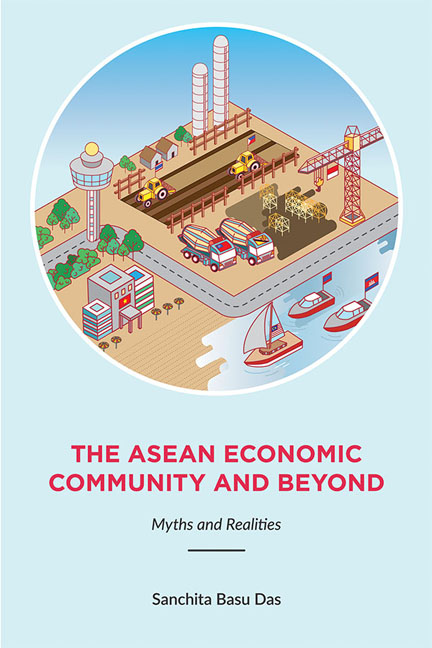Book contents
- Frontmatter
- Dedication
- Contents
- Foreword
- Acknowledgements
- Abbreviations
- 1 Introduction: The ASEAN Economic Community and Beyond
- I THE ASEAN ECONOMIC COMMUNITY (AEC)
- 2 The ASEAN Economic Community: An Economic and Strategic Project
- 3 Can the ASEAN Economic Community Be Achieved by 2015?
- 4 Goods to Flow Slow and Steady within the ASEAN Economic Community
- 5 The Limited Impact of the ASEAN Economic Community on Skilled Labour Migration
- 6 Five Facts About the ASEAN Economic Community
- 7 Growing Economic Diplomacy in ASEAN: Opportunities and Threats
- 8 Towards ASEAN Economic Community 2025!
- II BEYOND THE ASEAN ECONOMIC COMMUNITY
- III AN ASEAN PERSPECTIVE OF REGIONAL CONNECTIVITY
- Appendix: Summary of the Trans-pacific Partnership Agreement
- Index
- About the Author
6 - Five Facts About the ASEAN Economic Community
from I - THE ASEAN ECONOMIC COMMUNITY (AEC)
Published online by Cambridge University Press: 19 May 2017
- Frontmatter
- Dedication
- Contents
- Foreword
- Acknowledgements
- Abbreviations
- 1 Introduction: The ASEAN Economic Community and Beyond
- I THE ASEAN ECONOMIC COMMUNITY (AEC)
- 2 The ASEAN Economic Community: An Economic and Strategic Project
- 3 Can the ASEAN Economic Community Be Achieved by 2015?
- 4 Goods to Flow Slow and Steady within the ASEAN Economic Community
- 5 The Limited Impact of the ASEAN Economic Community on Skilled Labour Migration
- 6 Five Facts About the ASEAN Economic Community
- 7 Growing Economic Diplomacy in ASEAN: Opportunities and Threats
- 8 Towards ASEAN Economic Community 2025!
- II BEYOND THE ASEAN ECONOMIC COMMUNITY
- III AN ASEAN PERSPECTIVE OF REGIONAL CONNECTIVITY
- Appendix: Summary of the Trans-pacific Partnership Agreement
- Index
- About the Author
Summary
The paper attempts to explain five facts about the ASEAN Economic Community (AEC). First, the AEC was not developed on the basis of the European Union (EU) model, though there are some learning experiences to be gleaned from this process. For ASEAN governments, the AEC is a gradual process with long-term aspirations and is pursued in areas where it is felt necessary. Second, although AEC is a regional initiative, its implementation is carried out by the national economies. At the national level, implementation faces difficulties as each initiative is not the sole preserve of any one ministry, but rather multiple government ministries and other agencies. In the domestic economy, the AEC also generates proponents and opponents of integration, slowing down the pace of implementation further. Third, AEC is not the sole cause of increasing competition. For any single country, heightened competition is a part of the globalization process and there are other trade frameworks too — bilateral, regional and multilateral — that further economic liberalization. Fourth, ASEAN economic cooperation is a top-down initiative and hence awareness among stakeholders is low and uneven. With the looming deadline of 2015, voices from the private sector have begun to be heard. However, the advocacy for trade initiatives is not unanimous in nature and is often driven by the relative strength of particular firms that bring in more foreign direct investment to the country. Fifth, AEC should be seen in conjunction with the ASEAN Political-Security Community and ASEAN Socio-Cultural Community. As a result, it should not be seen in isolation when judging whether ASEAN can deliver on its community-building commitments.
INTRODUCTION
As the ASEAN Economic Community's (AEC) 2015 deadline approaches, the project suffers more detractors than supporters. A majority seems convinced that the initiative's deliverables, namely an integrated production space with free movement of goods, services, and skilled labour will not be achieved by December 2015 (Desker 2015; Menon 2014; and Banyan 2014).
This “bald” statement has some merit. But we must ask ourselves what the definition of economic community was when ASEAN decided to form an AEC. Even if we go with the notion that “ASEAN cannot deliver on AEC”, how far can we blame the organization? And can AEC, as the only regional initiative, be blamed for policy changes in each member country's domestic economy, and hence for the possible negative fallouts?
- Type
- Chapter
- Information
- The ASEAN Economic Community and BeyondMyths and Realities, pp. 59 - 67Publisher: ISEAS–Yusof Ishak InstitutePrint publication year: 2015



